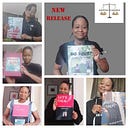LET'S TALK — Being Black
This is a true account of my experience with racism in the 1980s United Kingdom.
‘Three types of people wish me not to write this: the guilty, the ignorant and the people in denial. Natalie M Bleau Scripture of Balance
I was born in 1972 in a Salvation Army hospital in Hackney, London, United Kingdom.
My Parents originated from the Caribbean; they were honest, decent, hardworking people who raised me to have manners and respect for myself and others.
Going back to my early years, between the ages of 0–7, I never saw myself as any different to other children in my primary school.
We were just kids; we did not see colour and played together. The only people I noticed that got picked on were the Asian kids.
I was not aware that I was a minority in the UK. My parents protected me from people’s true feelings about us. They never told me about what they had experienced so that I could live as a normal child.
Only when I moved to South Wales did I realise I was different. I realised that I was black.
The ignorance and prejudices of most of the folk in this country, where we received much verbal racial abuse, I never experienced physical abuse at school.
My skin colour made me stand out as someone inferior to white people.
The abuse I suffered made me ashamed of the colour of my skin.
I remember regularly being spat at, mocked, and treated as a contagious disease by teachers and children.
I can tell you that 80% of the Welsh people were outright racist.
When I think back on it, it reminds me of watching a documentary about America in the 1960s.
Six years of my life was a living hell. I had problems at home, and my siblings ill-treated me, so there was no equilibrium whether I was at home or school.
‘jungle bunny’, ‘coonflakes’, ‘wogabix’ are some of the daily taunts I experienced from children. I was called ‘paki’, ‘blackie’, and I will never forget this ‘ginger-headed’ guy’ Neil Dyke, who told me I was born in a coal bunker. (wogabix = Weetabix, coonflakes=cornflakes)
People spat behind you whenever you walked. There were a lot more things, but they should have mentioned more.
When we moved back to London, I did not experience outright racism, but I knew it existed.
Racism goes both ways, and I can explain this.
I joined the Metropolitan Police Force in March 1991. I did not experience outright racism, but the black people were unkind to me; they saw me as an informer, and because my partner was white, that made me a coconut.
In the other jobs I have worked in, I have experienced other prejudices, whether it be colour, gender, or being slimmer than the boss. I have never played the race card, as the word falls loosely from the lips of other cultures for selfish means.
It has taken a lot for me to write this testimony as I wanted to leave this trauma behind me where it belongs.
Sharing is caring because someone else could benefit from hearing my story.
An Irish guy had told me that ’black people were not the only enslaved people that Irish people were first. I had two points to give him.
1. Black people were not only enslaved, but they were property. Irish people were treated harshly but were indentured servants, and some laws protected them. They attained their freedom once they finished their contracts.
2. Irish white people could hide their heritage, whereas black people could not be mistaken because of the colour of their skin.
There is no competition regarding racism; as a black person who sees and has experienced systematic racism, I know what I am talking about.
The people who suffered at the hands of Hitler can relate to extreme prejudice and sematic racism from 30 January 1933 to 8 May 1945.
Black slavery started in 1619 and for the UK ended on 25 March 1807, signed by King George III into the law Act for the Abolition of the slave trade. The 23rd of August is the International Day of the Remembrance of the Slave Trade and its abolition.
Britain transported 3.1 million Africans to be enslaved, but only 2.7 million arrived at the destination.
Slavery was not abolished in America when Abraham Lincoln signed the Emancipation Act in 1863, but continued until December 1865.
I wrote this information down because we are now in June 2023, and some people have not changed. There is still a divide amongst people; in the UK, it is subtle, but in America, it is obvious.
Remember, racism is ‘of the race’ and includes all races, people of colour and white. If I had hated anybody, it would be the ‘human race’ because of the injustice and the evil that perpetuates from them.
Many individuals have many obstacles in this life, but adding racism to them leaves you feeling hopeless. Sometimes being of colour comes across as a disability, especially for black males hence why a lot of them are looking to start their own businesses,
One thing I have learnt is not to let anyone put me in a position of feeling inferior to them, no matter what their prejudice against me. This message is for all humans.
Natalie Bleau
Scripture if Balance
